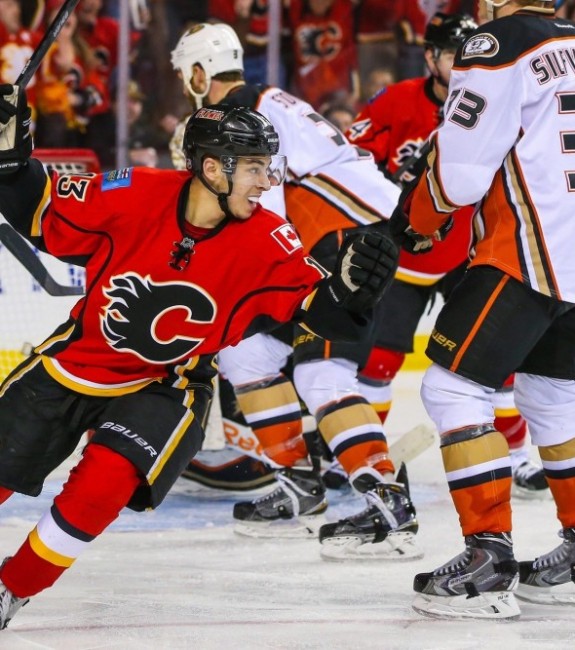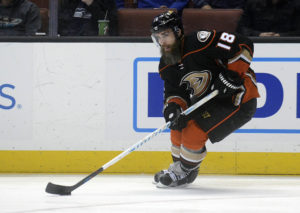With a win against the Los Angeles Kings on Sunday, the Anaheim Ducks clinched the top spot in the Pacific Division for the fifth year in a row. For the first round of the playoffs, they will be matched up against the Calgary Flames. The Ducks are 4-1 this season against the Flames, which gave the Flames a very unflattering record. After losing 25 straight games against the Ducks, the Flames broke the record for consecutive losses against a single opponent on their home ice. The previous record of 23 successive victories was held by the Philadelphia Flyers against the Pittsburgh Penguins.
Here are three things the Ducks must do to defeat Flames in the playoffs:
1. Shutdown Johnny Gaudreau

Since the Ducks have the home ice advantage, they can matchup with the Flames any way they want for the majority of the series. The shutdown line of Ryan Kesler, Jakob Silfverberg and Andrew Cogliano should be sent out against the Flames’ top line, or rather, any line that features Gaudreau. Recently, he has been paired with center Sean Monahan and right winger Michael Ferland. Together, the three have combined for 60 of the team’s 222 total goals this season, while Monahan leads the team in goals and Gaudreau leads the team in points.
The Ducks should also be wary of the Flames’ supporting cast as demonstrated in their lone loss to the Flames earlier this season, an 8-3 decision where eight different Flames scored. Gaudreau returned from a fractured finger injury that had kept him out for 10 games by opening the slew of scoring. Sam Bennett had the assist, and then proceeded to tally another and later, a goal of his own. He centers the third line, and the Ducks should be wary of him as well.
Even though head coach Randy Carlyle has switched up the Ducks’ lines a lot this season, he has kept the Ryan Kesler line intact. When the Ducks won the Stanley Cup in 2007, he used a similar strategy, finding a shutdown line and then sticking with it for the majority of the season. Back then, it was Rob Niedermayer, Samuel Pahlsson and Travis Moen.
Sending the Kesler line against Gaudreau’s line has benefited the Ducks in the past. Aside from Rickard Rakell, the three have the best plus/minus numbers out of all offensive players on the team. All season, they have been very effective in shutting down other teams’ top lines, especially because the line has also been so effective offensively as well as defensively. All three of them are top-five scorers for the Ducks with Jakob Silfverberg ranking No. 2 with 23 goals, including this beauty against the Flames:
2. Exploit Their Weak Defense
This video also exposes Gaudreau’s weakness: his lackluster defense. There’s no denying Gaudreau’s offensive prowess, but his defense is so nonexistent, he has the fourth worst plus/minus on the Flames. In this video, Kesler skates across the line with Gaudreau trailing behind making no defensive move whatsoever. He is in the perfect position right in between Kesler and Silfverberg to knock the puck away, but instead, he does nothing and barely even puts his stick down. Kesler effortlessly passes it to Silfverberg who then goes top-shelf on Flames’ goaltender Brian Elliot.
But, wait. There’s more.
Later in the game, with the score tied at three with about three minutes left, Kesler’s line (minus Silfverberg and guest starring Logan Shaw) exploited Gaudreau’s apparent disinterest in defense once again. Kesler skates into the zone with the puck, being guarded by defencemen Matt Bartkowski and Deryk Engelland. Skating slightly behind Kesler was Shaw. With both defencemen occupied, Shaw was being lightly covered by Gaudreau. As Shaw skates to the net, Gaudreau casually skates away from him, leaving him alone in front of the net.
Here’s a video of the resulting game-winning goal:
This is an issue for the Flames because their defense isn’t deep enough to hold off the Ducks’ much deeper offense in which all four lines have the potential to score. After all, Corey Perry has been playing on the third line at the side of the team’s leading scorer, Rakell. Bartkowski and Engelland are the Flames’ third defensive pairing, so it would have helped them out if Gaudreau and the rest of his line showed a little interest in defense.
Mark Giordano and Dougie Hamilton are the Flames’ best defensive pairing by far. Giordano leads the team in plus/minus with plus-22, while Hamilton leads all Flames defencemen in points. But aside from them, the Flames don’t have much on defense to speak of. Even though Corsi percentages have been criticized for not necessarily depicting how good a team is, it is important to note that aside from Giordano and Hamilton, most of the Flames’ defensemen have Corsi percentages below 50 percent, meaning they more often don’t have the puck than they do have it. Michael Stone, who often pairs with T.J. Brodie for the Flames’ second defensive pairing, has one of the worst Corsi percentages on the team with 45.5.
3. Convert on the Power Play

The Ducks have struggled on the power play all season, and even with the inclusion of Patrick Eaves, who has 13 power play goals this season for seventh in the NHL, it has only gotten slightly better. Granted, most of Eaves’ power play goals came from earlier this season when he played for the Dallas Stars, but his aggressive, go-straight-to-the-net playing style should be able to improve the Ducks’ power play, which sits at 17th in the league.
In February, the team was the absolute worst team in the league on the man advantage. They were given 32 opportunities and only converted on one of them. Since the beginning of March, the Ducks’ power play has gotten less atrocious, tallying 10 goals from 57 power play opportunities. Because of how imposing and hard-hitting the team is, the Ducks spend more time killing penalties than on the power play, but against the Flames, they will be given more opportunities with the man advantage. The Flames are the only team in the NHL to be penalized more than the Ducks.
The Flames’ penalty kill is 12th in the league. Not bad, but not good enough that the Ducks shouldn’t be able to find the back of the net on a couple of their opportunities.
If the Ducks play as well as they have been against the Flames in the past, they should be able to move past them to face the winner of the series between the Edmonton Oilers and the San Jose Sharks.